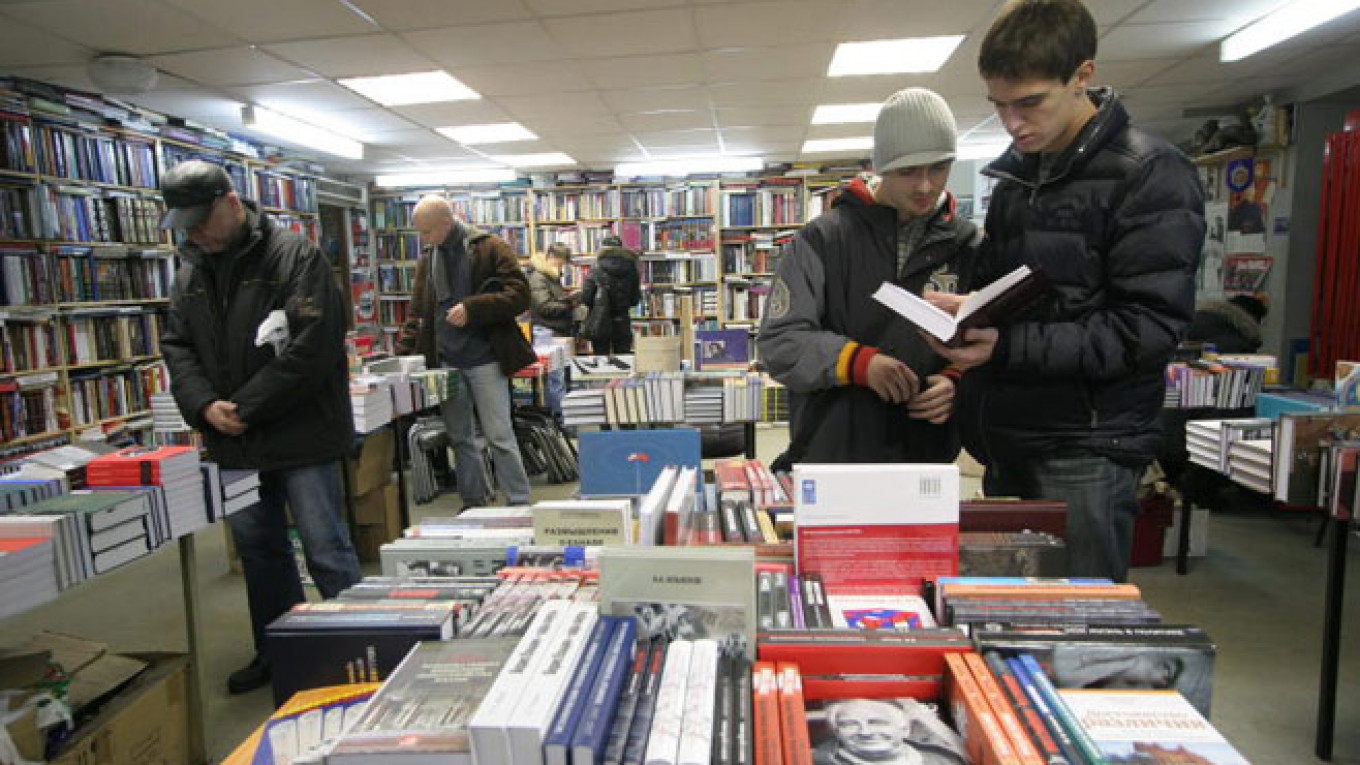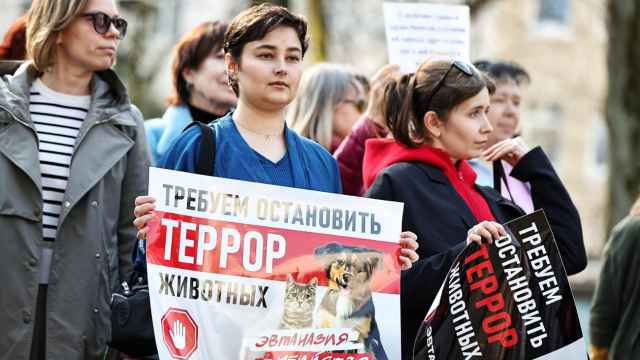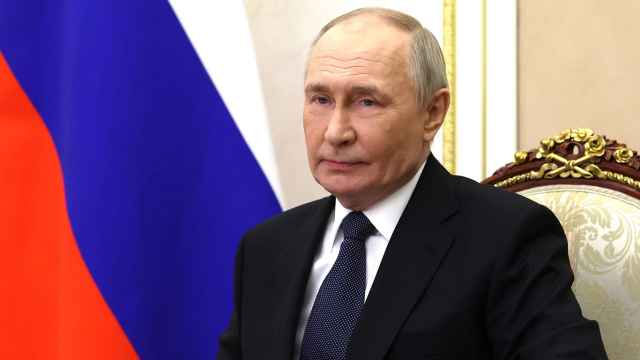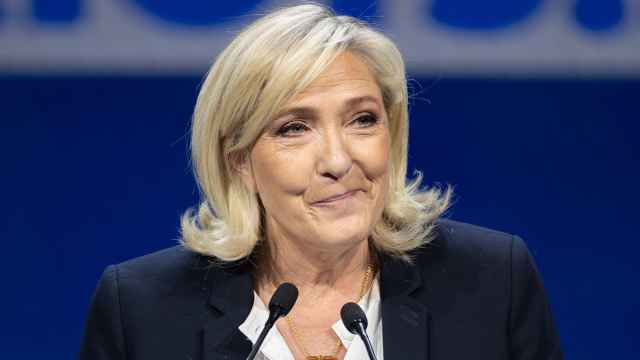More Russian bookshops are facing closure every year, shaking the publishing industry and threatening writing as a profession.
Bookselling, never the most profitable retail business, is struggling to stay afloat thanks to expensive shop rental rates and decreasing interest from customers.
In Moscow, considered the most well-read city in Russia, there are now 226 bookshops left to serve a population of 12 million, said Boris Kupriyanov, a publisher and co-founder of Falanster bookshop. In Paris, whose population is five times smaller, there are 700 bookshops, he added.
As the number of bookshops declines, the problems in the bookselling industry are feeding through to Russian publishers and writers.
Oleg Filimonov, vice president of the Russian Publishers Association, described the negative feedback loop: Bookshop closures reduce the retail space available to publishers, who respond by printing fewer books. To break even on smaller print runs, the price per unit has to rise. Customers respond to higher prices by buying less, then falling sales push more bookshops out of business, reducing retail space still further.
One answer to this problem, at least for publishers, might be sales of electronic books. But rampant piracy means revenues from digital sales are low. And the less money made by publishers, the less they can pass on to the producers of content — the writers.
Waning Reading Culture
A major problem for bookshops is that Russians are losing interest in reading. Despite the country’s reputation for literature and literacy, last year more than half of Russians didn’t read a single book, up from one-quarter in 2009, Sergei Stepashin, president of the Russian Book Union told news agency TASS this month.
Young people see books as pure entertainment, and in that category they cannot compete with modern gadgets, said Kupriyanov. Without measures by the state to stimulate interest in reading and promote books as a source of education, interest will continue to wane, he said.
The number of bookshops in Russia has already fallen from 8,500 in the 1990s to 1,500 now, said Stepashin.
If we lose the battle for this generation, our future will be gloomy, Filimonov said.
Exorbitant Burden
Fading interest from customers is one problem, but many bookshops are closing because rent costs are too high.
In the Soviet era, bookshops were freed from paying rent and even received some subsidies to pay utilities bills.
“Now we have the same rental rates and taxes for bookshops as for liquor stores,” Filimonov said.
Special privileges, such as reduced rental rates, are applied only to the outlets of Russia’s leading bookshop chain Dom Knigi (Moscow House of Books), according to Kupriyanov. Others live or die by the market, and with retailers in other, more profitable industries able to pay higher rent, bookshops, especially small ones, are forced to close.
The introduction in July this year in Moscow of a trading fee, a fixed quarterly payment that stores must pay to legally sell goods, will increase the burden further.
To cover these costs, larger bookshops are allocating more space to related products or mutating into cultural centers, combining under one roof a cafe and a venue for hosting concerts and workshops.
But smaller stores have fewer options. Worst placed to withstand the strain are second-hand bookshops. Moscow has only six such shops, according to the All-Russia People’s Front, a political movement backed by President Vladimir Putin that has lobbied against the trading fee, so far unsuccessfully. Paris, the front says, has around 7,000 second-hand bookshops.
The result of these financial pressures will be that new bookstores won’t open, and only big book chains will survive, said Kupriyanov.
Falling Circulations
The effect of bookstore closures has been to reduce the quantity of printed words.
Last year, the number of book and brochure titles published in Russia was the lowest in seven years, according to a report issued by the Federal Press and Mass Media Agency. With the number of titles falling, the size of print runs is also declining, and the total amount of printed material shrank by 10.4 percent last year compared to 2013, according to the report. More than half of books published in Russia now have a circulation of less than 1,000 copies, it said.
Smaller print runs mean that each book is more expensive to produce, exacerbating a problem of affordability for consumers. Book prices are also rising due to the devaluation of the ruble over the past year, which inflated the cost of imported printing materials. And a 10 percent sales tax is levied on books, far above the norm in most developed countries, according to Filimonov.
The average book costs 350 rubles ($6), according to Denis Kotov, CEO of bookstore chain Bookvoed — or 30 percent of the average Russian’s daily wage.
Electronic books are less vulnerable to rising printing costs, but despite steady growth, the share of electronic books in total market sales is no more than 2 percent, according to the Federal Press and Mass Media Agency report. Most Russians who read electronic books download them for free via pirate websites.
As a result of declining sales and published works, the writing profession in Russia is coming under threat of extinction.
There are currently 10-12 people in the whole country that can earn their living only by writing books, and there will be even fewer of them in the future, Filimonov said.
Contact the author at bizreporter@imedia.ru
A Message from The Moscow Times:
Dear readers,
We are facing unprecedented challenges. Russia's Prosecutor General's Office has designated The Moscow Times as an "undesirable" organization, criminalizing our work and putting our staff at risk of prosecution. This follows our earlier unjust labeling as a "foreign agent."
These actions are direct attempts to silence independent journalism in Russia. The authorities claim our work "discredits the decisions of the Russian leadership." We see things differently: we strive to provide accurate, unbiased reporting on Russia.
We, the journalists of The Moscow Times, refuse to be silenced. But to continue our work, we need your help.
Your support, no matter how small, makes a world of difference. If you can, please support us monthly starting from just $2. It's quick to set up, and every contribution makes a significant impact.
By supporting The Moscow Times, you're defending open, independent journalism in the face of repression. Thank you for standing with us.
Remind me later.






